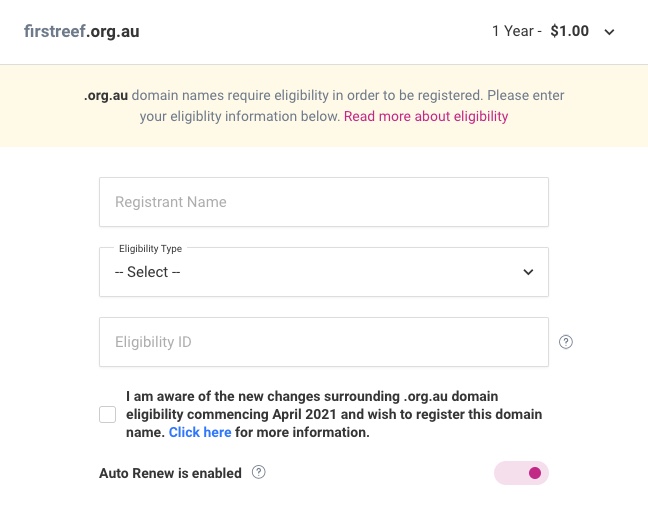
As of April 12th 2021, new rules surrounding the eligibility for .au domains will take effect.
This will affect all country code Top Level Domain (ccTLD) variations, including .org.au, .com.au, .net.au and international domains such as .例如.au.
Don’t panic, as there is a good chance these new rules won’t affect you, or you will be able to make changes to prevent losing access to your domain.
In this article, I will outline the new rules and steps you can take to make sure you are still eligible for your domain.
.com.au / .net.au
New Rules
The changes to eligibility for .com.au and .net.au domains will mainly affect foreign businesses and non-registered businesses/entities.
To be eligible for a .com.au or .net.au domain, you must meet the Australian presence test (have a connection to Australia) by meeting one of the following categories:
- Be a registered Commercial Entity (see below)
- Own an Australian trademark (or have a pending trademark application)
- Using a trademark as your eligibility has stricter rules over commercial entities (see below)
Commercial Entities
Most Australian businesses will fall under the commercial entity category. This includes:
- a company under the Corporations Act 2001(Cth)
- *a Commonwealth entity as defined in section 10 of the Public Governance, Performance and Accountability Act 2013(Cth)
- a Registrable Body under the Corporations Act 2001(Cth)
- an Incorporated Association under State or Territory legislation
- an entity or natural person issued with an Australian Business Number under the A New Tax System (Australian Business Number) Act 1999 (Cth)
- *a Statutory Body under Commonwealth, State or Territory legislation that engages in trade or commerce
- a Trust issued with an Australian Business Number (ABN) but does not include a charitable trust or a public or private ancillary fund
- *an Incorporated limited partnership under State and Territory legislation
- *a Trading Cooperative under State and Territory legislation
- *Government, being either the Crown or a Commonwealth, State or Territory statutory agency
- a foreign legal entity or a natural person who holds or has applied for an Australian Trade Mark.
*Items that are bold are new additions to the definition.
Australian Trademark
If you are a foreign business or a local business using a trademark as your eligibility for a .com.au or .net.au domain, a few changes have been made that may affect your eligibility.
Previously, your registered domain name had to be “closely and substantially connected” to your trademark. However, in the new licensing rules, your name must be an *exact match to the words in your Trademark.
*To quote the auDA, an exact match means:
“… that the domain name being applied for is identical to the words which are the subject of an Australian Trade Mark. The domain name must include all the words in the order in which they appear in the Australian Trade Mark, excluding:
- DNS identifiers such as com.au;
- punctuation marks such as an exclamation point or an apostrophe;
- articles such as ‘a’, ‘the’, ‘and ’or ‘of’; and
- ampersands.”
For example, if you own the trademark for “A Pretty Horse Carousels”:
You can have:
- aprettyhorsecarousels.com.au
- prettyhorsecarousels.net.au
You can’t have:
- phc.com.au
- horsecarousels.com.au
*Please note these strict naming rules only apply to businesses using a trademark as their eligibility criteria. Commercial entities can still register domains that are “closely and substantially connected”.
What if I’m not eligible?
If you don’t meet any of the above criteria, here are a few actions you can take before April 12th:
- Apply for a new trademark that matches your existing domain (e.g. Trademark “Horse Carousels”)
- Register a new domain that matches your existing trademark exactly, and redirect traffic to the new domain
- Consider a new legal structure for your business to be considered a commercial entity (e.g. apply for an ABN/ACN)
- Register a new non-commercial domain, such as .id.au or .au.
.org.au
New Rules
The changes to eligibility for .au domains are going to impact .org.au domains the most.
If you are an unincorporated association, you will no longer be eligible for a .org.au domain unless your association appears on the Australian Charities and Not for Profit Commission’s register or you meet the definition of a not-for-profit below.
Defining a not-for-profit
If your association meets any of the following categories, you are a not-for-profit and are eligible to register a .org.au domain.
- an Incorporated Association under State or Territory legislation;
- a Company limited by guarantee under the Corporations Act 2001(Cth)
- *a Non-distributing co-operative registered under State or Territory legislation;
- *an Indigenous Corporation registered under the Corporations (Aboriginal and Torres Strait Islander) Act 2006(Cth) and which appears on the Register of Aboriginal and Torres Strait Islander Corporations;
- a Registered Organisation that is:
(a) an association of employers;
(b) an association of employees (union); or
(c) an enterprise association;
registered under the Fair Work (Registered Organisations) Act 2009(Cth) and which appears on the Register of Organisations; - a Charitable trust endorsed by the Australian Taxation Office as a Deductible Gift Recipient;
- *a Non-trading cooperative under State or Territory legislation;
- a Public or Private Ancillary Fund endorsed by the Australian Taxation Office as a Deductible Gift Recipient;
- an unincorporated association that appears on the Register of Charities established under the Australian Charities and Not for Profit Commission Act 2012(Cth);
- a Political Party registered under the Commonwealth Electoral Act 1918(Cth) or State or Territory Electoral Act and which appears on the Register of Political Parties or as otherwise named; or
- *Government, being either the Crown or a Commonwealth, State or Territory statutory agency.
*Items that are bold are new additions to the definition.
What if I’m not eligible?
If you don’t fit into any of the categories above, you have a few actions you can take, depending on your circumstances.
- Consider a new legal structure for your association to meet one of the above definitions.
- Register a .asn.au domain
- Unincorporated associations are eligible to register in the asn.au namespace.
- Consider keeping your new domain as close to your previous one as possible to avoid confusion.
- Let your visitors know the change ASAP to avoid dead links.
Naming / Allocation rules
Thankfully, the rules around the naming of your domain (e.g. organisationname.org.au) have been relaxed to allow for a wider range of names to be used. For a full list of the allocation rules, visit the auDA website and scroll to “Changes to the .org.au allocation rules”.
.id.au
New Rules
Under the new rules, you can no longer register a .id.au domain that refers to a personal interest or hobby; instead, it is now limited to serve as a personal identifier.
A .id.au domain name must suit any of the following:
- a match to a Person’s legal name, first name or family name
- an acronym or abbreviation of the Person’s legal name, first name or family name
- a nickname of the Person.
The commencement date for changes to the .id.au ccTLD has not been announced but is expected to occur in late 2021.
What if I’m not eligible?
If you do not meet the criteria above, consider using a .au domain (e.g. myhobby.au).
Confirm your eligibility
If your business/association meets any of the above eligibility criteria, ensure you log in to your domain registrar before April 12th and update your eligibility.
Most domain registrars will allow you to edit your eligibility information directly in their control panel, otherwise reach out to their support ASAP.
You must check your current eligibility information to make sure it meets one of the above definitions before April 12th.

What if my domain doesn’t expire before April 12th?
Thankfully, the new rules will only apply to domains that are registered or renewed after April 12th. This means if your domain isn’t due for renewal for another two years, you have two years to ensure you are still eligible, and if it’s due before April 12th, you will have at least another year.
However, if, for example, your domain is due for renewal on April 13th, you will need to confirm your eligibility sooner rather than later.
If your registrar allows it, it would be a good idea for you to renew your domain before April 12th to ensure you don’t lose access to your domain when the new rules come into place.
More information
For more detailed information on these changes, state and territory changes or the complaints process, visit the auDA website.